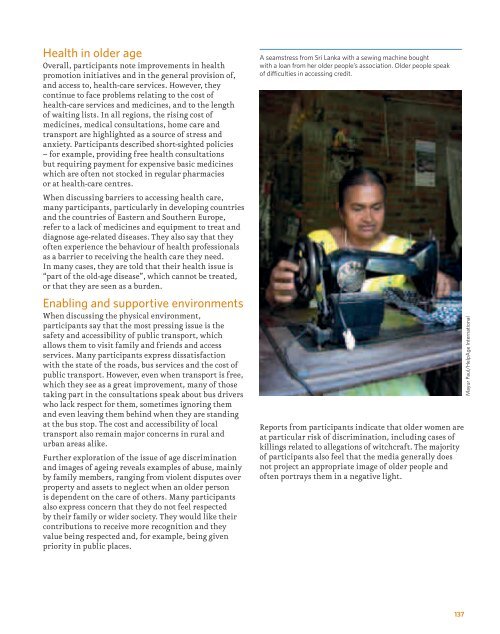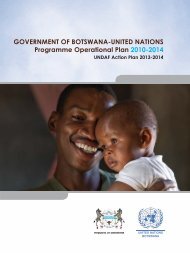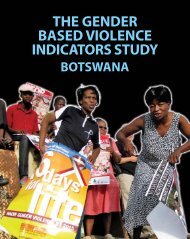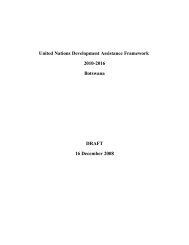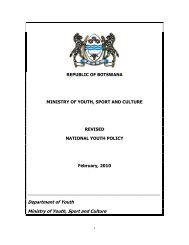Ageing in the Twenty-First Century: - HelpAge International
Ageing in the Twenty-First Century: - HelpAge International
Ageing in the Twenty-First Century: - HelpAge International
Create successful ePaper yourself
Turn your PDF publications into a flip-book with our unique Google optimized e-Paper software.
Health <strong>in</strong> older age<br />
Overall, participants note improvements <strong>in</strong> health<br />
promotion <strong>in</strong>itiatives and <strong>in</strong> <strong>the</strong> general provision of,<br />
and access to, health-care services. However, <strong>the</strong>y<br />
cont<strong>in</strong>ue to face problems relat<strong>in</strong>g to <strong>the</strong> cost of<br />
health-care services and medic<strong>in</strong>es, and to <strong>the</strong> length<br />
of wait<strong>in</strong>g lists. In all regions, <strong>the</strong> ris<strong>in</strong>g cost of<br />
medic<strong>in</strong>es, medical consultations, home care and<br />
transport are highlighted as a source of stress and<br />
anxiety. Participants described short-sighted policies<br />
– for example, provid<strong>in</strong>g free health consultations<br />
but requir<strong>in</strong>g payment for expensive basic medic<strong>in</strong>es<br />
which are often not stocked <strong>in</strong> regular pharmacies<br />
or at health-care centres.<br />
When discuss<strong>in</strong>g barriers to access<strong>in</strong>g health care,<br />
many participants, particularly <strong>in</strong> develop<strong>in</strong>g countries<br />
and <strong>the</strong> countries of Eastern and Sou<strong>the</strong>rn Europe,<br />
refer to a lack of medic<strong>in</strong>es and equipment to treat and<br />
diagnose age-related diseases. They also say that <strong>the</strong>y<br />
often experience <strong>the</strong> behaviour of health professionals<br />
as a barrier to receiv<strong>in</strong>g <strong>the</strong> health care <strong>the</strong>y need.<br />
In many cases, <strong>the</strong>y are told that <strong>the</strong>ir health issue is<br />
“part of <strong>the</strong> old-age disease”, which cannot be treated,<br />
or that <strong>the</strong>y are seen as a burden.<br />
Enabl<strong>in</strong>g and supportive environments<br />
When discuss<strong>in</strong>g <strong>the</strong> physical environment,<br />
participants say that <strong>the</strong> most press<strong>in</strong>g issue is <strong>the</strong><br />
safety and accessibility of public transport, which<br />
allows <strong>the</strong>m to visit family and friends and access<br />
services. Many participants express dissatisfaction<br />
with <strong>the</strong> state of <strong>the</strong> roads, bus services and <strong>the</strong> cost of<br />
public transport. However, even when transport is free,<br />
which <strong>the</strong>y see as a great improvement, many of those<br />
tak<strong>in</strong>g part <strong>in</strong> <strong>the</strong> consultations speak about bus drivers<br />
who lack respect for <strong>the</strong>m, sometimes ignor<strong>in</strong>g <strong>the</strong>m<br />
and even leav<strong>in</strong>g <strong>the</strong>m beh<strong>in</strong>d when <strong>the</strong>y are stand<strong>in</strong>g<br />
at <strong>the</strong> bus stop. The cost and accessibility of local<br />
transport also rema<strong>in</strong> major concerns <strong>in</strong> rural and<br />
urban areas alike.<br />
Fur<strong>the</strong>r exploration of <strong>the</strong> issue of age discrim<strong>in</strong>ation<br />
and images of age<strong>in</strong>g reveals examples of abuse, ma<strong>in</strong>ly<br />
by family members, rang<strong>in</strong>g from violent disputes over<br />
property and assets to neglect when an older person<br />
is dependent on <strong>the</strong> care of o<strong>the</strong>rs. Many participants<br />
also express concern that <strong>the</strong>y do not feel respected<br />
by <strong>the</strong>ir family or wider society. They would like <strong>the</strong>ir<br />
contributions to receive more recognition and <strong>the</strong>y<br />
value be<strong>in</strong>g respected and, for example, be<strong>in</strong>g given<br />
priority <strong>in</strong> public places.<br />
A seamstress from Sri Lanka with a sew<strong>in</strong>g mach<strong>in</strong>e bought<br />
with a loan from her older people’s association. Older people speak<br />
of difficulties <strong>in</strong> access<strong>in</strong>g credit.<br />
Reports from participants <strong>in</strong>dicate that older women are<br />
at particular risk of discrim<strong>in</strong>ation, <strong>in</strong>clud<strong>in</strong>g cases of<br />
kill<strong>in</strong>gs related to allegations of witchcraft. The majority<br />
of participants also feel that <strong>the</strong> media generally does<br />
not project an appropriate image of older people and<br />
often portrays <strong>the</strong>m <strong>in</strong> a negative light.<br />
Mayur Paul/<strong>HelpAge</strong> <strong>International</strong><br />
137


